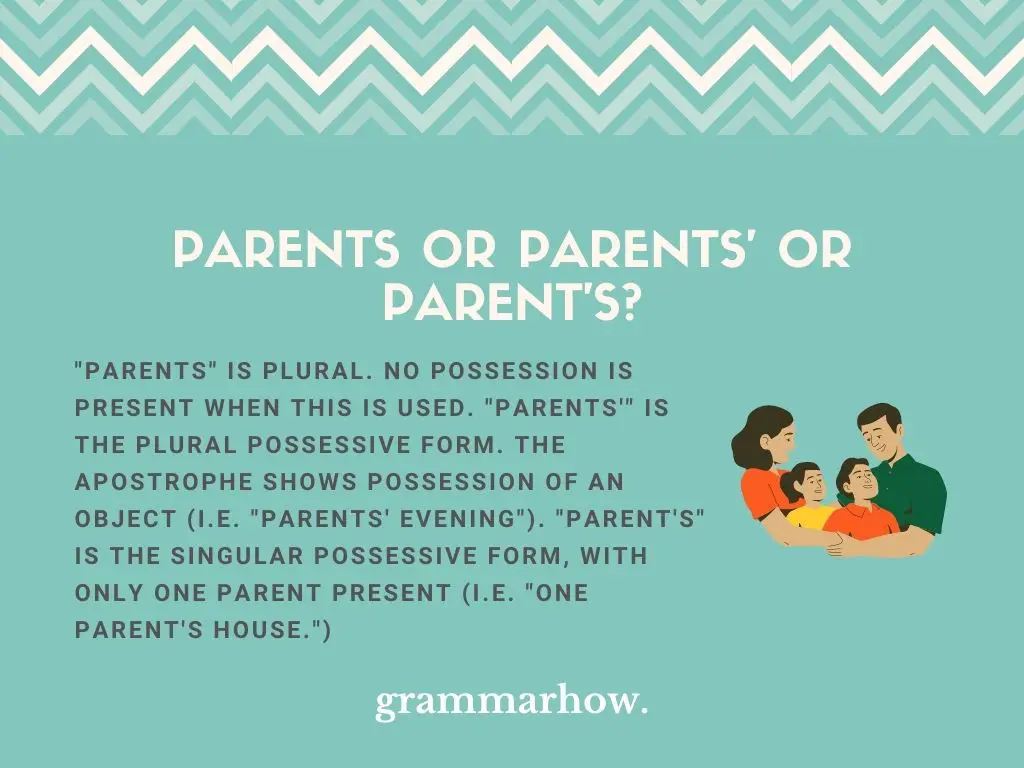The possessive form of “parent” can seem confusing at first glance. It seems that “parents,” “parents’,” and “parent’s” all play a role. We’ll help you understand what the differences between these three forms are.
Parents or Parents’ or Parent’s?
“Parents” is plural. No possession is present when this is used. “Parents'” is the plural possessive form. The apostrophe shows possession of an object (i.e. “parents’ evening”). “Parent’s” is the singular possessive form, with only one parent present (i.e. “one parent’s house.”)

Check out the following to help you understand the main forms.
| Singular | Parent |
| Plural | Parents |
| Singular possessive | Parent’s |
| Plural possessive | Parents’ |
It’s quite simple to figure out the possessive rules for regular nouns like “Parent.” You can pair the singular forms and the plural forms with each other once you understand how the additional apostrophe comes up.
With the singular possessive form, grammar rules teach us to add an “‘s” to the end of the singular noun. This means that “parent” becomes “parent’s” when one parent owns an object.
The plural possessive form has slightly different rules. You only need to add an apostrophe after the plural form because it already ends with an “s.” The apostrophe still shows ownership without the need for a second “s.”
Parents
“Parents” is the plural of “parent,” which comes with no specific possession. It works when writing about more than one parent.
In the plural form, “parents” can refer to related parents or groups of parents with no relations. The “s” is added to the end of the singular form to simply show a group of parents.
- My parents do not want anything to do with him. They really didn’t like what he had to say.
- His parents went to the orientation to figure out what they needed to do next.
Parents’
“Parents'” comes from the plural form but adds a layer of possession. This forms works when many parents own objects that relate to each other, even if there isn’t a physical item to “own.”
It’s very common for things like “Parents’ evening” to be mentioned here, as “evening” is an owned object in which multiple parents can participate.
- I’m not sure when my parents’ anniversary will be. I’ll have to let you know.
- The parents’ meeting didn’t go according to plan. It wasn’t nearly as fun as it sounded.
You’ll find the owned object comes after “parents'” in every situation. This helps readers to understand the possession and where it comes from.
Parent’s
“Parent’s” is the singular possessive. It comes from the singular word “parent.” You should use this form when one parent owns an object. It’s not as common as the plural possessive form because “parents” tend to come in groups.
Still, there are times when you might benefit from referring to a single parent rather than a group of them.
- This is his parent’s demand. I don’t know which one said it, but he needs to get it done.
- One of my parent’s divorce papers was not signed correctly. I don’t know which one.
Conclusion
Remember, “parents” is the simplest form of them all. The plural form refers to multiple parents in the same context.
“Parent’s” works when a single parent owns an item (i.e. the parent’s signature). It’s known as the singular possessive form.
“Parents'” works when several parents own an item (i.e. “parents’ night out”). In other words, it’s the plural possessive form.

Martin holds a Master’s degree in Finance and International Business. He has six years of experience in professional communication with clients, executives, and colleagues. Furthermore, he has teaching experience from Aarhus University. Martin has been featured as an expert in communication and teaching on Forbes and Shopify. Read more about Martin here.
